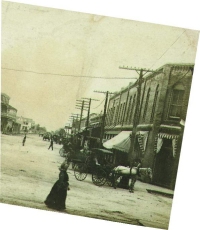| Home | About Us | Attractions | Hospitality |
Links
|
Area Community Profile
Looking back on 154 years of life in Alvin can tell a lot about its future.
The determination of settlers to build a life in the area began with one homestead paving the way to a city of family life and business.
The cattle industry brought settlers to the area in 1845, where Elisha and Missouri Thomas, their children and slaves built a home of cedar logs.
The Santa Fe Railroad built a water tank at what is now the historic depot and holding pens for cattle were built on the banks of Mustang Bayou 15 years later. The company needed an overseer and employed Alvin Morgan who purchased land at a dollar an acre and built a home.
As the area developed, more settlers moved in and he opened a general store and saloon. He later moved a box car from the railroad and converted it into a post office. The citizenry proclaimed the area a town, and when the population reached 49. they named it Morgan.
However they learned that a town with that name already existed in Texas and changed its name to Alvin, still honoring their founding father.
Until the 20th century, cattle claimed the majority of the economy, but eventually strawberry farming became a way of life as well. With the short life span of the fruit, ice was needed and blocks, cut from frozen rivers and lakes in northern states was shipped in to Alvin.

Boxes were also needed to ship the strawberries and thus two businesses developed: T. J. Hicks Magnolia Warehouse and Alvin Box and Material Company.
Rice farming was one of the major changes that Alvin has seen since its inception in 1948. R. T. "Bob" Briscoe began farming and shipping rice and two rice dryers and two rice mills still exist today.
In the 1930's, oil was discovered in eastern Brazoria County and even today, oil plays a big part in the economy.
Today, growth and development makes the community productive, yet a hometown feeling of friends and family still exists. The treasured buildings from the past are now being renovated and house new businesses in Alvin.
